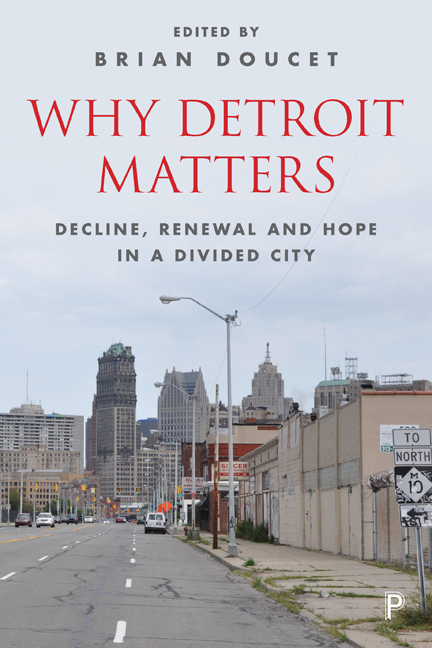Book contents
- Frontmatter
- Contents
- List of contributors
- List of figures and tables
- Acknowledgments
- one Introduction: why Detroit matters
- Section One Lessons from Detroit
- Intermezzo I You may not know my Detroit
- Section Two Practices from Detroit
- Intermezzo II My Detroit
- Section Three Conversations from Detroit
- References
- Index
twenty-two - Feedom Freedom Farmers
Published online by Cambridge University Press: 05 April 2022
- Frontmatter
- Contents
- List of contributors
- List of figures and tables
- Acknowledgments
- one Introduction: why Detroit matters
- Section One Lessons from Detroit
- Intermezzo I You may not know my Detroit
- Section Two Practices from Detroit
- Intermezzo II My Detroit
- Section Three Conversations from Detroit
- References
- Index
Summary
The term “urban garden” may be too narrow to describe the work that Wayne Curtis and Myrtle Thompson-Curtis do with their Feedom Freedom farm on Manistique Avenue on the far east side of Detroit. In 2009, they planted their first seeds in a formerly abandoned lot next to their home. Today, they grow food on roughly one acre of land. It is shared with the community and sold within the neighborhood, as well as at Eastern Market.
For Wayne and Myrtle, growing food is an act of revolution that is closely connected to their consciousness as African-Americans oppressed under capitalism. Urban agriculture is done out of necessity and is an act of taking control of their lives under an economic system that has rendered much of Detroit's population expendable. Feedom Freedom evolved into a teaching garden, and through numerous roundtable discussions, they organize cooking workshops and their Art in the Garden Program. They also run garden learn and play events with children and their caregivers in order to teach about food and how they can contribute. Wayne is a former Black Panther member and comes from a long tradition of activism rooted in Detroit's economic and racial struggles. Myrtle has lived her whole life on the east side of Detroit. For more, see: http://feedomfreedom.anderswift.com/
What made you decide to focus on a community garden?
Myrtle: I wouldn't say that what we do is anything phenomenal. It's been done since time began. I don't buy into the idea that in order to stay alive in this world, I need money for everything. We do what we do because we resist. It is also an act of love for ourselves, and our love for others. So when I do what I do, I’m not trying to get rich out of it; it's not going to save Detroit. You can grow all the food you want; it's not going to save Detroit because we are tied to this system. But it is an act of saying that I think differently than all these laws and policies that are being enacted. I am tapping into my consciousness. As a human being, I understand that food is meant to keep me alive, it's not meant to make me rich. For us, growing food is an act of revolution. It's a revolutionary act of love, not just for ourselves, but for others.
- Type
- Chapter
- Information
- Why Detroit MattersDecline, Renewal and Hope in a Divided City, pp. 315 - 320Publisher: Bristol University PressPrint publication year: 2017

